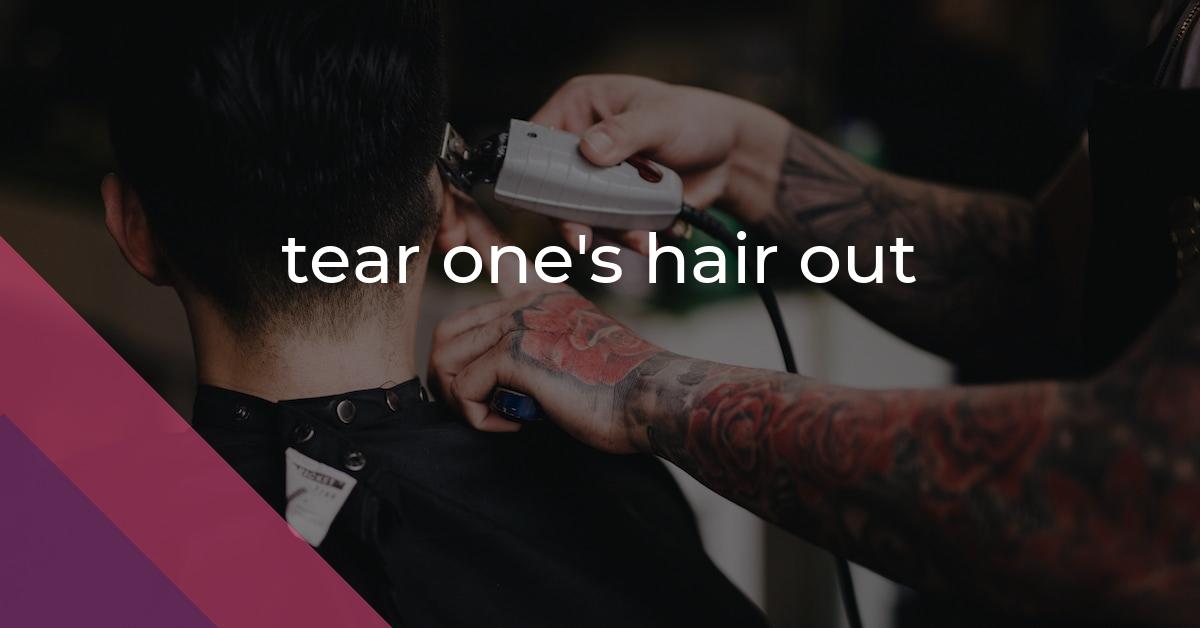tear one’s hair out: Idiom Meaning and Origin
What does ‘tear one's hair out’ mean?
The idiom "tear one's hair out" means to be extremely frustrated or stressed, often to the point of pulling on one's own hair forcefully. It is used to describe a situation where someone is feeling overwhelmed or exasperated.

Idiom Explorer
The idiom "sweat of one's brow" means to work hard and put in physical effort to achieve something. It emphasizes the idea of earning or deserving through hard work and exertion.
The idiom "spit feathers" means to be extremely angry or frustrated.
The idiom "short hairs" is an expression used to describe a difficult or challenging situation, often implying a sense of being trapped or in a vulnerable position.
The idiom "set one's hair on fire" means to become very excited, frantic, or panicked. It is often used to describe a state of extreme urgency or alarm.
The idiom "rend one's garments" means to express extreme sorrow, grief, or distress by tearing one's clothes apart forcefully. This action is often done as a cultural or religious expression of anguish or despair.
The idiom "reduce someone to tears" means to make someone cry or become extremely upset.
The idiom "on a tear" means to be in a period of great energy, enthusiasm, or success, often characterized by continuous and rapid activity or accomplishment.
Hair-raising Frustration
The idiom "tear one's hair out" is a commonly used expression in the English language. It is often used to describe a state of extreme frustration or distress. This phrase is a figurative expression that does not have a literal meaning. It is used metaphorically to convey the idea of someone being so distressed or frustrated that they feel compelled to physically pull out their own hair. While this action is not to be taken literally, it serves as a vivid and dramatic way to describe a high level of exasperation.
The origin of this idiom can be traced to the concept of hair being associated with emotions. Hair has long been symbolically linked to various emotions and states of mind. In many cultures and throughout history, hair has been seen as a representation of a person's identity, beauty, and vitality. It is also closely connected to emotions such as anger, anxiety, and stress.
The act of tearing one's hair out is an exaggerated gesture that signifies extreme distress and frustration. It implies a sense of desperation and powerlessness in the face of a difficult situation or problem. People may use this phrase when they are overwhelmed by stress, exasperated by a challenging task, or dealing with a seemingly insurmountable problem. The idiom "tear one's hair out" is often related to the idiom "set one's hair on fire". This phrase is used in a similar context to convey a heightened level of distress and urgency. It suggests that someone is so overwhelmed by a situation that they feel as if their hair is on fire, emphasizing the severity of their distress. Both expressions serve as vivid and dramatic ways to depict extreme frustration and distress.
Another related idiom is "tear up", which can also be used to describe someone's heightened emotional state. "Tear up" is often used to express intense sadness or strong emotional reactions. It is used to convey the idea of someone being so emotionally moved that they are brought to tears. This idiom is commonly used in situations where someone is deeply touched by something, such as a heartfelt speech or a touching moment. When someone is "tearing their hair out", they may also feel a sense of emotional overwhelm that could lead them to tear up. Both idioms highlight the intensity of someone's emotional response to a particular situation.
When someone says they are "tearing their hair out," it is an expression of their intense emotional state and their struggle to cope with the situation at hand. It highlights the extent of their distress and conveys the feeling of being pushed to one's limits. This idiom is commonly used in both casual and formal contexts to emphasize the severity of someone's frustration or exasperation. Similarly, the idioms "set one's hair on fire" and "tear up" are also used in similar contexts to convey heightened emotional states and intense reactions.
Overall, the idiom "tear one's hair out" reflects a vivid and impactful way to describe extreme frustration or distress. Through its metaphorical nature, it effectively captures the intensity of emotions experienced in challenging situations. This idiom continues to be widely used in contemporary English and serves as a powerful tool for expressing strong emotions. In addition, the related idioms "set one's hair on fire" and "tear up" further contribute to the rich and varied language available to describe intense emotional states.
Example usage
Examples:
1. After struggling with the complicated math problem for hours, she was ready to tear her hair out in frustration.
2. The constant bickering between the siblings was enough to make their parents tear their hair out.
3. The project deadline was approaching and he still couldn't figure out how to solve a critical issue, causing him to want to tear his hair out.
More "Frustration" idioms



